- Home
- Priscilla Royal
The Proud Sinner Page 2
The Proud Sinner Read online
Page 2
As if startled by the movement, Abbot Ilbert’s eyes flew open, and he shook his head back and forth with frightening violence. His eyes were glazed, and his pupils were almost completely black.
In fear, the lay brother jumped away.
Ilbert began to howl, and his body arched and fell with powerful convulsions. As if he were fighting off a band of demons, he beat his arms against the bed.
The abbot’s servant screamed and ran from the room.
Shaking off her own surprise, Sister Anne ran forward but instantly realized she could do nothing to help the man.
As quickly as the convulsions had started, they were over. His body still, Ilbert lay on the bed like a heap of discarded clothes.
Looking down at him, the sub-infirmarian knew without question that Abbot Ilbert was dead.
***
“Dead? He is really dead?” Odo, the rotund Abbot of Caldwell, ran his tongue around his plump lips while his thick-skinned brow attempted to furrow in dismay. “How unfortunate for us all.”
Prior Andrew said nothing. Bending his painful leg, he shifted his weight to the stick he often used now to help him walk.
Prioress Eleanor had been prepared to offer the abbot sympathy over the tragic death of a brother servant of God. She had not been ready for his reaction that expressed more annoyance than sorrow. Fearing she might reveal her surprise, she bowed her head and murmured something incomprehensible.
It did not matter what she said. The Abbot of Caldwell was not listening.
Abbot Odo gazed over their heads and around the courtyard with the fervor of a pilgrim seeking a holy site. Then his eyes settled with evident joy on the newly constructed guest quarters a short distance from where they all stood. “A gift to Tyndal Priory from Queen Eleanor, or so I have been told.”
As he waved in the direction of the new building and smiled, Eleanor found his expression had an unexpected charm and seemed oddly familiar. That observation unsettled her even more than she had been over his callousness.
“Our queen possesses a deep faith,” she said, keeping any excess of both humility and pride out of her voice. “We were grateful she honored our priory with one of her many benevolent acts.”
He nodded with a twinkle of amusement in his eyes.
This man might easily be dismissed as one too obsessed with the carnal pleasures of food and drink to offer any threat, she thought, but she concluded that the sparkle suggested a perceptive intelligence and cunning wit. Perhaps he takes pleasure in playing with the foolish who, because of his corpulence, underestimate him. She resolved not to be one of that number.
“I assume we shall be housed there soon? The air is icy, and our journey has been a tiring one. I am sure your hospitable charity includes a hot meal sufficient to revive us.” A slight mockery lurked behind his otherwise genuine and openly joyful anticipation of supper.
Dangerously clever or not, Eleanor thought, Abbot Odo was still a man who divided his day, not by the hours of prayerful Office, but by the arrival of meals. Perhaps she was being unkind, but surely God would forgive her. As for penance, she was certain it would be appropriate to the magnitude of her sin.
“The lay brothers are preparing your rooms now. As soon as you are settled, the kitchen will serve a supper for you. Because we were unable to plan for your visit, this meal must be a simple one, prepared in accordance with the Rule of Saint Benedict and shared by those of us who live and pray here. I promise, however, that it will be sustaining.” The prioress’ smile was calculated to answer the abbot’s mockery with scorn.
The abbot looked troubled.
Ignoring him, the prioress asked Prior Andrew to go to the warming room and confirm that the lay brothers were preparing the guest quarters, not sitting idly around the fire. The request was unnecessary, but she knew his leg ached badly from the cold. By greeting the new visitors to Tyndal, her prior had sufficiently honored his obligation under the rules of monastic hospitality and need not suffer any longer.
Glancing at her with gratitude for the escape she offered, the prior hastily limped away.
Abbot Odo cleared his throat. “Supper is always a cold meal in, ah, smaller monasteries. Surely not here!” As if reminding her that he was an abbot while she was a mere woman, whatever her rank and birth, his eyes bored into the tiny prioress standing before him.
Eleanor, her staff of office held firmly in hand, boldly met his gaze. “A hot one is always prepared here in winter.” She quickly softened her voice. “Although it will be a humble stew, Sister Matilda will make sure the quantity is sufficient even for those few in your party who are not accustomed to the meager diets we chose when we vow ourselves to God’s service.” As a woman, the prioress was skilled in the art of issuing a barbed retort properly wrapped in a humble tone.
He blinked.
She had won that contest.
“Wine? I assume you have decent wine?”
“We and our gracious King Edward share the same wine merchant.”
“Ah.” Odo sounded like a man who had just been serviced by an especially skillful prostitute and was much relieved. “I should have remembered,” he added with that familiar and troubling smile.
“You seem quite knowledgeable about Tyndal Priory,” Eleanor said, growing more curious than she knew she ought to be. Yet why would he know so much about an obscure little priory near the coast of East Anglia? “I thought Caldwell Abbey was far to the south of here.”
Odo glowed with the delight of a chess player about to checkmate his opponent’s king. “You do not know?”
“I am an ignorant woman,” Eleanor replied.
“My younger brother is Crowner Ralf. I grew up in this boggy land, although God was kind enough to spare me too many years of suffering here.”
To stop herself from betraying her total loss of composure, Eleanor clutched her staff of office until her fingers hurt. If the crowner had ever mentioned his second brother’s name, she had forgotten it. “We shall immediately send word to him that you have arrived,” she said in a steady enough voice.
“Do not rush to summon him,” Odo muttered. “I would not grieve if I never saw the foul reprobate again.”
Eleanor knew that Ralf, the king’s man and her friend, felt the same about Odo, servant of God and Abbot of Caldwell.
Chapter Three
Odo stabbed his knife into his bowl of stew. Broth splattered the immaculate white tablecloth, dotting it with brown spots.
Sitting beside him, Abbot Gifre stopped eating long enough to glare at the wanton stains. “Were you never taught manners? Your family rank may not be as high as mine, but surely they were not villeins.”
“This is a wretched meal.” The Abbot of Caldwell glowered at his table companions. “Where is the meat? Has anyone found a single morsel?”
Two chose to shake their heads. The others ignored him.
“Is it too much to ask for a little venison to be served to honored guests? This broth would be meager fare for a Lenten stew.” Odo wiped his knife carefully on a piece of bread, popped the flavored lump into his mouth, and slammed the knife down next to the bowl before shoving the spoon to one side. “This prioress is favored by King Edward and his queen. Surely royal beneficence extends to gifts of fresh meat from the king’s forests.”
“Meat heats the blood,” Didier replied, his expression conveying the proper look of disapproval.
“Drink your wine, Abbot Odo,” Abbot Mordredus said after a final sip of the stew. “Perhaps it will blunt your foul mood even if the meal cannot fill your capacious stomach.” He leaned over and let his eyes gaze on Odo’s rounded belly with undisguised scorn. “If you imbibe your usual quantity, you will soon believe the bits of chicken are the finest venison.”
“Chicken? You had chicken in your supper?” Odo glared into his bowl. “I found only parsnips.” He grunted. “I h
ate parsnips.”
“There is a turnip.” Abbot Tristram raised his spoon with the pale root vegetable visible. Then he seemed to lose interest in his meal, dropped the item back into his bowl and began to slowly twirl his spoon in the partially eaten stew.
“Hush, all of you!” Abbot Ancell carefully placed his spoon beside his bowl and looked around at the party of abbots. “Have you each forgotten that one of our brothers in Christ has just died?”
“Not a man known for his sanctity.” Abbot Mordredus tore off a piece of bread from the loaf he shared with Didier and rubbed it around his bowl.
Ancell put a finger to his lips. “I advise discretion, lest we encourage wicked gossip among those less able than we to distinguish virtuous criticism from the vice of idle talk.” He bent his head toward the table of their servants not far removed from their own.
Silence fell.
Two Tyndal lay brothers arrived with more loaves of bread and an ewer of wine.
Despite his complaints, Odo reached for the large earthenware container of stew he shared with Gifre. Before he added more to his bowl, he first stood and hunted for chunks of chicken hidden with the root vegetables, serving himself all the bits of meat he found.
Gifre waited for his companion to display good manners and offer to serve him. When Odo chose instead to ladle spoonfuls from his bowl into his mouth with a dedicated celerity, Gifre called to one of the Tyndal lay brothers and asked to be given the remaining broth, now significantly bereft of chicken. Although he did not speak, his narrowed eyes expressed very clearly the depth of his contempt for the uncouth Abbot of Caldwell.
“This stew was quite hot,” Abbot Didier remarked with evident pleasure as he looked up at the lay brother who placed another barley loaf between him and the abbot who shared portions with him.
“Prioress Eleanor not only ordered a new kitchen to be built adjacent to these guest quarters,” the young lay brother said, “but an enclosed passageway from there so the food is not chilled by winter winds.”
“If she is that clever,” Odo growled, “she could have gotten decent meat to serve us instead of these wretched vegetables. Surely, her infirmarian has told her that vegetables are not good for a man’s health.”
“The seasoning of the dish is pleasant,” Gifre muttered.
Odo chewed thoughtfully on a piece of fowl. “A parsnip is a parsnip, no matter how a cook tries to disguise it. Even mutton would be an improvement.”
Ancell opened his mouth to say something but evidently thought better of it and went back to his wine. He waved aside more of the dark bread.
A priory lay brother bent to whisper in Abbot Gifre’s ear.
The abbot glanced over at the servants’ table and pursed his lips as he pondered his decision. “They have eaten enough, Brother.” He glanced around at his companions. “Shall we agree to dismiss them from the table so they might prepare our bedding for the night?”
Most nodded. Ancell failed to respond. He had folded his hands and shut his eyes.
Gifre waved the lay brother off in the direction of the servants who had already assumed their meal was over and had risen to attend their tasks. A couple of them whisked chunks of bread into their sleeves.
Another priory lay brother asked the abbots if they wished a man to lead them to the church for the Offices.
Abbot Tristram politely refused the offer. “Each of us has brought his own prie-dieu on this journey. For the Offices, we shall gather here for evening and morning prayers.”
“As it pleases you,” the lay brother replied, carefully keeping even the mildest censure out of his voice. “But the choir of monks at our priory is renowned for beautiful singing, and you may wish to hear them. Many have claimed that their voices, raised to God in praise, are like a joyous blessing.” The lay brother’s eyes twinkled, although it was unclear whether he was expressing delight over the singing or amusement over the hesitancy of these abbots to suffer a walk through the chill winter air to experience the wonder.
“The denial of such pleasure shall be one of our penances,” Tristram replied and looked at his unfinished meal. His face was pale enough to suggest he alone might have cause to avoid the cold night walk.
Once told there was no further need for them to remain, the Tyndal lay brothers disappeared from the dining room.
As soon as they were alone, Abbot Didier sighed. “I suppose we shall all pray tonight for Abbot Ilbert’s soul.”
“As we must for all sinners,” Ancell replied. “He was also one of our most revered brothers in Christ or he would not have shared this arduous journey to Norwich.”
Odo had found a chicken bone in his stew and was sucking on it. “I did not understand why he came. Surely Rome knew of his inequities and would have found his presence offensive at this meeting.”
“It was the special papal legate who requested his attendance in Norwich.” Ancell waved his hand in front of his face and began to rub his reddening eyes. Because supper had begun later than usual, and darkness had fallen, a lay brother had found only two common tallow candles to provide light. Unlike waxen ones, these emitted a thick, reeking smoke. “Ilbert was known for his ability to command donations from many wealthy nobles for the desired crusade, if not men willing enough to take vows and fight.” The abbot coughed.
Didier sat back in his chair. “Surely he was misinformed about Ilbert’s character or he would not have summoned him just for the coin he might bring.”
Ancell did not reply and continued to massage his now-tearing eyes.
“I doubt that,” Mordredus said. “His sins were infamous. Even I had heard he was a man suffering from violent wrath, and our abbeys lie at some distance from each other. But I should not condemn on hearsay. All mortals suffer from the weakness of the flesh and fall into sin. Some are contrite and struggle daily with Satan.” His glance rested on Didier for a long moment. “Others do not. Perhaps our dead brother had repented, served his penance, and become a man of gentler wisdom.”
“Many praised Ilbert for his righteous anger and saw God’s purifying fire blazing in his eyes when he lashed out with his whip at the wicked.” Tristram clutched his hands in a prayerful manner.
Didier slammed his fist on the table. “And many did not see anything virtuous in his anger. I never did! My nephew was one of his clerks. Ilbert beat him until the lad almost died.”
“What was your nephew’s sin?” Mordredus leaned forward, eyes wide with interest.
“It was Lent. He had been fasting and collapsed, spilling ink on a good piece of parchment. Ilbert ordered him tied to a pillar and then whipped him himself.”
No one said a word.
Ancell broke the silence. Although his voice was hushed, it rang with piercing sharpness in that room of speechless abbots. “Did your nephew remain in Ilbert’s service?”
Didier’s lips twisted into a sneer. “He went back to his parents who cared for his wounds. When he healed, he bid farewell to them, barricaded himself in his old room, and has never emerged. He still lives, for the servants swear they hear him praying.”
Mordredus squeezed his chin with his fingers before saying, “Yet that suffering may have led him to a holier life.”
“Without doubt, his suffering will lead him directly to God,” Didier replied, “for my nephew will surely starve himself to death soon. Is a marred piece of sheep’s flesh worthy of such cruelty by a man sworn to God? I pray daily that the boy will find peace and return to the loving arms of his family.”
Odo saw that Gifre had left some stew in his bowl, reached over, and pulled it toward him. Raising the bowl, he gulped the little left and burped.
Gifre closed his eyes and did not open them until he faced the other side of the table where he did not have to gaze upon his fellow abbot’s ample jowls.
“Perhaps,” Odo said, “Ilbert’s death was punishment for his s
ins.” He ran a fingernail between the gaps in his front teeth. “As I heard the tale, the convulsions preceding his death were violent. Lay brothers had to hold him lest his fits caused him to fly off the bed. His eyes darkened and bulged. He repeatedly struck his head and howled.” The abbot looked around the table. “Might we not conclude that this death was a proper one for a man of wrath?”
The priory bells began to ring for Compline.
Chapter Four
The next morning, grey mist covered the white earth with soft melancholy. A thin winding sheet of snow had fallen overnight.
The mood of the gathered abbots, their servants, and the priory leaders, who had come to wish them a safe journey to Norwich, was minimally brighter.
Prioress Eleanor looked with anticipation toward the open priory entrance gate. She had sent Brother Thomas to remind Crowner Ralf that his brother had not only arrived but would soon leave. There might be little love between them, but Ralf was loyal to his family and his absence was odd.
“Where is Abbot Tristram?” Gifre was already seated on his horse. His tone suggested impatience to be on his way.
Abbot Didier pointed toward the hospital. “I see him coming.”
The missing abbot was slowly wending his way toward the party. Two lay brothers were assisting him.
“He was taken ill in the night,” Sister Anne said, bending close to her prioress so others would not hear her. “I advised him to stay in our care until he was well, but he rejected my counsel. Either he has improved significantly or has reason not to let his companions travel on without him.”
Eleanor knew that tone of voice well. Her friend and sub-infirmarian was annoyed that the patient had rejected her guidance. When she looked at the expression on Abbot Tristram’s face, however, she immediately concluded that the man should have taken it.
“You have caused us to delay,” Abbot Mordredus said, his voice as cutting as the winter air. “The special papal legate awaits our arrival!”
Tristram stiffened and waved aside his assistants. “I am ready to leave now.”

 The Twice-Hanged Man
The Twice-Hanged Man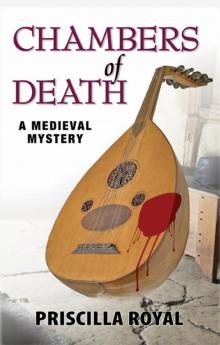 Chambers of Death mm-6
Chambers of Death mm-6 Forsaken Soul
Forsaken Soul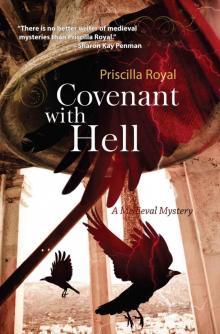 Covenant With Hell (Medieval Mysteries)
Covenant With Hell (Medieval Mysteries)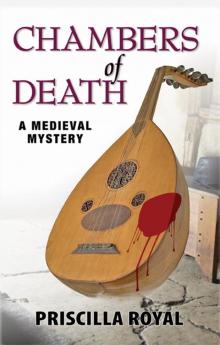 Chambers of Death
Chambers of Death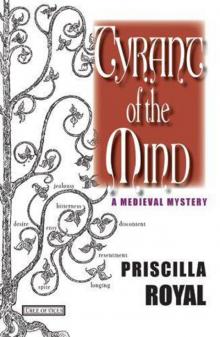 Tyrant of the Mind
Tyrant of the Mind Wild Justice
Wild Justice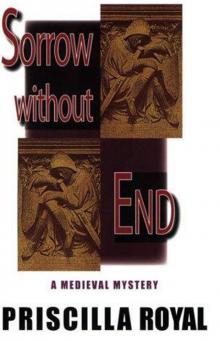 Sorrow Without End
Sorrow Without End Wine of Violence
Wine of Violence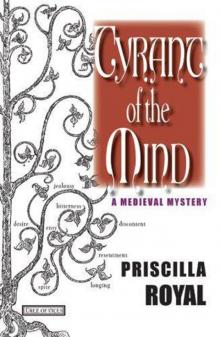 Tyrant of the Mind mm-2
Tyrant of the Mind mm-2 The Sanctity of Hate
The Sanctity of Hate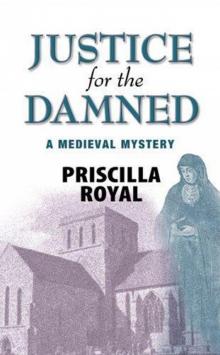 Justice for the Damned
Justice for the Damned The Proud Sinner
The Proud Sinner A Killing Season mm-8
A Killing Season mm-8 Forsaken Soul mm-5
Forsaken Soul mm-5 Valley of Dry Bones mm-7
Valley of Dry Bones mm-7 Valley of Dry Bones
Valley of Dry Bones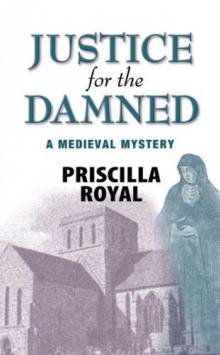 Justice for the Damned mm-4
Justice for the Damned mm-4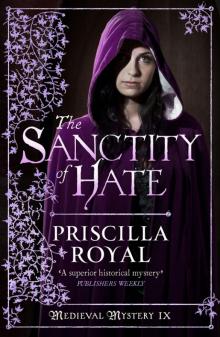 Sanctity of Hate
Sanctity of Hate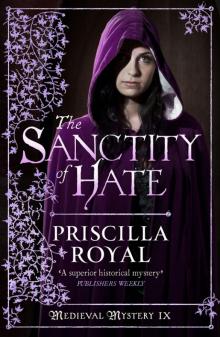 Sanctity of Hate mm-9
Sanctity of Hate mm-9 Wine of Violence mm-1
Wine of Violence mm-1